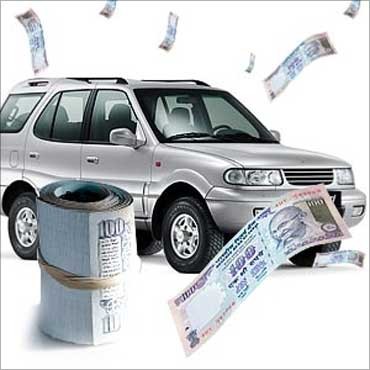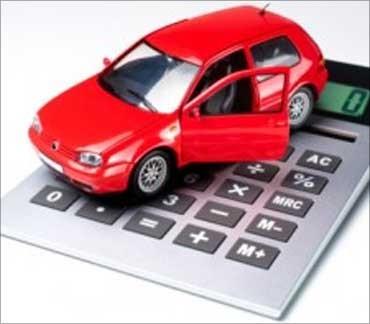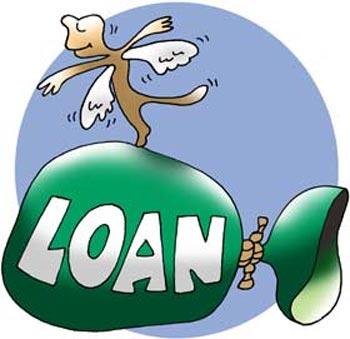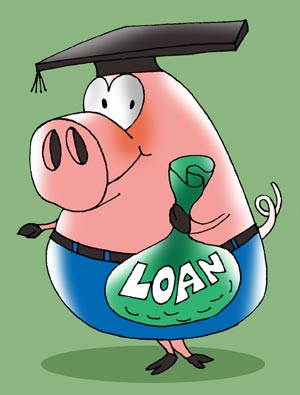 | « Back to article | Print this article |
Need FAST cash? Get a loan against your car
This loan costs you less than personal loans and credit card advances and you can avail of it even when your credit history is not exemplary.
Life is full of uncertainties. There are times when an individual needs fast access to a considerable amount of cash. But, s/he may not know from where to raise it at a short notice. Plus, for those who are already repaying several loans, unforeseen cash needs are a worrisome situation.
People caught in crises like these can resolve their dilemma easily by taking loans against their cars. Banks and non banking finance companies readily offer loans against cars to individuals as these are secured loans. There is no need to be an existing customer of the bank to avail this facility from one. It means that borrowers can approach any bank offering this scheme and pledge their vehicles to avail funds. Although, it is not a widely advertised loan product, many leading banks, such as HDFC Bank and Kotak Mahindra Bank, are offering 'loans against cars' schemes for new as well as used cars (as old as 5 year old).
This type of loan is also known as a 'car overdraft' facility and can be compared to taking a personal loan from banks. Like personal loans, they can be availed for any purpose and there is no restriction on the end use of the money raised through this loan. On top of that, as car overdraft is a form of secured loan, interest rates on these are lower than personal loan interest rates. As for the loan amount, borrowers can get up to 85 per cent to 90 per cent of the value of the car as loans. Loans against cars generally have to be repaid within a period of 1 to 3 years.
Courtesy:
Need FAST cash? Get a loan against your car
How does a car overdraft work?
The lender opens a current account with zero balance in the borrower's name. On opening of the account, the borrower gets the usual bank utility items like cheque books etc. But, before sanctioning the loan, lenders first hypothecate the car against which loan is availed.
Hypothecation of the pledged vehicle is a very important feature of this loan.
In this, a lien is marked on the hypothecated vehicle's certificate of registration, which is a document providing proof of ownership of a vehicle. This prevents the hypothecated vehicle from being sold until the loan is repaid and the lender removes the lien from the car's registration certificate.
Then, banks release the loan amount in the newly opened current account of the borrower, from which s/he can withdraw money as and when s/he needs it. Interest is not levied on the entire overdraft limit, but, only on the amount withdrawn by the borrower.
Just like the procedures followed in granting any other kind of loan, before giving loans against cars also banks check the credit history of the loan applicant from the credit information provider CIBIL. Apart from this, the background of the applicant is also analysed to check her/his repayment capacity while sanctioning the loan amount.
Need FAST cash? Get a loan against your car
Loan amount
The amount of loan that can be raised depends on the value of the car.
Used cars are valued by experts appointed by the banks themselves, for which some banks charge around Rs 275. For new cars, which have been financed by taking a car loan, the amount equal to the overdraft limit minus the remaining amount of car loan is released in the borrower's account. Usually, banks lend anywhere between Rs 50,000 to Rs 7 lakh as loans against cars.
Type of vehicles against which loans can be raised
All cars, not more than 5 year old, can be used to apply for these loans. Even those cars which have been bought by taking a car loan can be pledged with banks for the purpose. All lenders providing car overdraft have their own list of cars which are accepted by them for the purpose of lending. But, banks generally do not provide loans against imported cars or car models which have been phased out.
Need FAST cash? Get a loan against your car
Documents required for availing loans against cars
The following documents have to be submitted by the applicants along with the loan applications to the lenders:
1. Address proof: like electricity bill, telephone bill, passport, voter ID etc.
2. Identity proof: PAN card, voter ID, passport etc.
3. Business proof: VAT/CST Registration No., Warehouse Receipts, Establishment Act Certificate etc. In case the applicant is self employed and is engaged in business, s/he has to provide her/his companies business profile on the firm's letterhead.
4. In case an applicant is repaying an existing loan, then the sanction letter and the repayment schedule of that loan.
Apart from this, some documents may be asked for by the lender after the loan has been sanctioned.
Need FAST cash? Get a loan against your car
Who should opt for loans against cars?
These loans are a good option for people who need fast access to cash to meet some unforeseen situations, like medical emergencies etc, and may find it difficult to avail other loans if they have already availed multiple loans. It is also a good option for people with bad credit history who are having difficulty in getting loans, as lenders will get a security in the form of the car.
The interest rates of car overdraft are lower than personal loan rates and credit card advances.
Some banks providing loans against cars
- HDFC Bank
- ICICI Bank
- Kotak Mahindra Bank
- Reliance Consumer Finance
- Tata Capital




